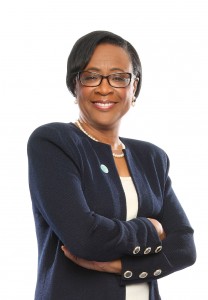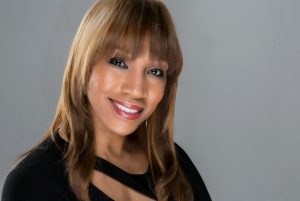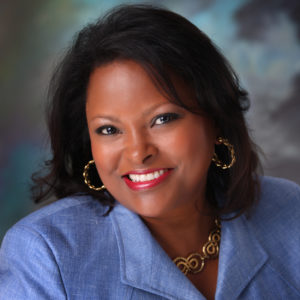[ad_1]
In the final installment of this 2-part series, we dive deeper with these extraordinary women and ask them what advice they have for women, especially black women, on how to successfully bring one’s authentic self to work.
Many black women in corporate America lit a figurative candle in honor of the retirement of Ursula Burns, the last black woman to occupy a CEO post in a Fortune 500. She left a chasm so deep and complex, essays were written about it. With her natural hair and no-nonsense straight talk, she was a credible example of black excellence in the boardroom. Since then, we watched the first woman and first black woman become a CEO in the NBA, Cynthia “Cynt” Marshall, and celebrated. But even she has stories to tell when it comes to breaking in, successfully climbing up, and bringing others with her.

(Image: Cynthia Marshall, CEO, Dallas Mavericks)
[RELATED: BRINGING YOUR AUTHENTIC SELF TO WORK AS A BLACK WOMAN — UNPACKED, PART, 1]
Marshall frequently offers sage advice for women in the workplace; encouraging women to #HASU or, “hook a sister up.” She recalled her first day in a corporate environment recently for Black Enterprise. She said she went home that evening knowing she couldn’t return with her church shoes, which happened to be red, even though that was really all she had. She frantically told her mother that she had to remove her braids as well because her boss’ supervisor told her so. They stayed up all night taking them down. The first black cheerleader at the University of California, Berkeley, who attended on scholarship because of her engineering skills, knew she was smart, but for some reason, no one cared about all that on her first day. They seemed to be focused on the packaging. With black women noted as the most educated group of any group in the U.S., how is it that people in corporate environments seem to get stuck on hairdos and outfits?
It raises the question; can you show up to your corporate job on the first day as your authentic self as a black woman and be taken seriously? The horrifying experience taught the head of the ninth largest NBA franchise something she said she will never forget.
Authentic Doses
MARSHALL: Yes, you can show up as your authentic self [on day one], but you need to know the playing field, and if your authentic self is going to be risky, and [how] to manage the risk. During the interview process, you hope that proper vetting has been done and a good match has been made—that you are a good match for the organization and that they are a good match for you, and I mean all of you. But you know what? My advice is: You could just never bring all of you—just ALL of you—in there on day one. At least I know I can’t. I know I have a personality that is sometimes larger than life, and I just can’t. I just have a personality and charisma, so I’ve been told, and some people don’t like all that, because they will misjudge you. They will mistake all the personality for a lack of smarts. And I use to hide the fact that I love numbers, so I didn’t want to be known as a geek until I knew that was OK too. So it’s risky. It’s risky. Just do your homework. Know what that means to bring all of you, and then you make the decision: do you want to bring all of you? I choose when I first start out not to just bring all of me up in there. Because first of all, I don’t know that they deserve all of me. I have to check it out first. You have to know the playing field. That is what practice is all about. You have to practice and know it all. And when it’s game time then you can bring as much of you as you think is necessary to be in there. Never be phony. I’m not saying be an impostor.

(Image: Cheryl Grace, SVP of U.S. Strategic Community Alliances and Consumer Engagement at Nielsen, Inc.)
Senior Vice President of U.S. Strategic Community Alliances and Consumer Engagement at Nielsen Inc., Cheryl Grace has written a book on the subject. It is called Climbing out of Entry-Level Hell: The Newbie’s 12 Steps Up the Career Ladder of Success. She admits that when she first started her career, she had to find ways to be herself, but at the right times for different audiences.
GRACE: When you are first starting a job, it is very important to pay attention to the corporate culture when you are interviewing and understanding that you have a good vibe with that corporate culture. And will you feel comfortable living in that environment every single day? When you are first starting out, you don’t have anything under your belt to say, “I’ve don’t this, this, and this, I can deliver.” You haven’t done anything yet. So I do think it is important at the beginning of your career to at least go along with the corporate culture, at least until you can stand on your own successes. Once you can stand on your own successes, and not be focused on how you speak or how you dress, they will know that this is the “money person” here. This is the rainmaker, the person who can deliver. Until you have that, in my personal opinion, you should get in where you can fit [in] until you can prove yourself.
I have a lot of young women who come to me as mentees and say that they are a little more aggressive, that their personality is a little strong. They don’t always necessarily understand that this is sometimes cultural. What I’ve learned is that when I’m in a certain setting, I might lower my voice about it. I’ll speak softly about it, because then, they are listening to me, and they are reacting to what I’m saying and not my animation. I’ve learned over the years that since I have such a robust personality that if I want my message to be heard I need to scale it back sometimes for people who may not be used to being around people with robust personalities. I soften my voice. I change my tone, I smile when I talk, and I sit on my hands.
You have to have self-awareness. I worked in politics early on, so I picked up on cues very early on. But, in corporate, as well when I was surrounded by all white men, I knew that it was important for them to hear what I had to say, but I knew that they were not going to listen if they were distracted by the way I was dressed, or by my tone or anything other than my message. I was about halfway through my career and in my 40s when I finally started to understand the impact I could have in a corporate boardroom.
Packaging is Key

(Image Sheryl Adkins-Green, CMO Mary Kay)
ADKINS-GREEN: In life, we typically dress for the occasion. In the office, the occasion requires that we look professional and pulled-together for the role that we have and the people, clients, or customers that we interact with. Fortunately, today, there are many knowledgeable resources who can help women create a polished professional image, including Mary Kay Independent Beauty Consultants. But, beyond hair, makeup and fashion, executive presence also includes how one speaks, how one enters the room, how one arranges or decorates their workspace, and more. Everything speaks! We have each been created on purpose, for a purpose.
If I could give three pieces of advice to women who want to show up to work as their most authentic selves it would be this:
- Believe in yourself—if you don’t believe in you, why should others believe in you?
- Don’t try so hard to fit in that you become average, unless you want to be viewed and considered just average. To be extraordinary, you need to celebrate your “extra,” not your “ordinary.”
- Replace doubts with doing, replace worry with effort. Stay focused on the role that you can impact
Finally, comparison is the killer of confidence— leverage what makes you “YOU!”
Learning How to Flex Authentically
Career coach and the author of EQUALITY: Courageous Conversations About Women, Men, and Race to Spark a Diversity and Inclusion Breakthrough, Trudy Bourgeois calls this adaptability in the workplace “style flexing.” A little less drastic than code-switching, she describes it as the ability to bring the tools from your personality arsenal to the table for the right audience at the right time. Code-switching or much worse, being someone that you’re not, can bring its consequences. But she offered some hope for day-one authenticity. The founder and CEO of the Center for Workplace Excellence believes it can be done, under the right circumstances.

(Image: Trudy Bourgeois, founder/CEO of the Center for Workforce Excellence)
BOURGEOIS: You can show up day one in an authentic way if you bring [your] game. You are a brand; and packaging matters in branding. Packaging matters in marketing. If you know what you stand for and you know how you want the world to experience you, you show up that way. How you carry yourself does include what you wear. So we have to be mindful that our brands stand for something.
When we are in a position to demonstrate our brilliance, people will accept us for who we are, but we have to be consistent. We can’t cover, and that means we can’t pretend to be someone we are not. And I did it. I took on male leadership behaviors because I was the only female, the only African American female and I wanted to be accepted. So I figured if I cussed, if I pop a couple of Buds on the golf course, or be “Ms. Tough-Tough Talk,” that I would be accepted, and indeed I was, but here’s the thing that happens. One day I looked in the mirror and A) I didn’t know who I was looking at and B) I didn’t like the person I was looking at. I had to go on my own personal journey to understand what I value and what do I say that I stand for. Am I showing up in a way that is congruent with my beliefs and values and my desire to have an impact in the world? People can’t have that conversation with others until they have had that conversation with themselves.
It’s about the ability to create your own opportunities by sharing your natural brilliance, and at the same time to be able to style-flex to respond to the needs of your audience. I can be true to who I am without breaking who I am. But also we need to realize that every audience that we interface with is looking for something different. We are multifaceted, and we have to wield the multifaceted components of who we are. You go into your toolkit and you pull out what is appropriate for the audience at that moment. The ability to style-flex without compromising our authentic selves is smart. That relates to the topic of executive presence. That is understanding how to carry yourself at the right time in the right place in the right way.
It’s important for all of us to know who we are and what we stand for. Period. You can’t play at your highest level if you don’t know who your true self is, and you can’t be authentic without knowing. But when you are focused on adding value, people will give you the grace to be who you are if you are adding value. If you are not adding value, you are suspect. Everything that we do, every single encounter, our stock level is either going up or it is going down. When people get to know you, they become more comfortable with you, and they have to like you. You have to be likable, and how do you do that? You have to deliver some goods.
Creating Your Own Equality
Bourgeois believes that that knowing your value and being able to communicate your value proposition not only opens doors, but it creates opportunities that will level the playing field, and in most cases, put you ahead of the pack. She calls it creating your own equality, and it begins with knowing yourself and being authentic about it. The rest, she says, can lead to seismic change for you, your company, the industry, and sometimes the world.
BOURGEOIS: I want to teach people to create their own equality because we have to stop thinking that someone else is going to create it for us. We have to create our own opportunities and our own equality. That starts with who are you and what do you bring to the table? Equality is having equal access. It’s access to knowledge, access to information, access to relationships. If you are intent on being who you are—and everybody should be—then you can create your own equality by knowing how to add value, but understanding how to build your own strategy, understanding what your value proposition is and having a platform. I meet people and I ask them what they do and they will give me the title of their jobs, which means nothing to me. We need to be able to talk about what value we bring and what impact that we are bringing to the world, and that is how people will see you in a different light. People actually want to give you opportunities. Then, this is what happens, people say: How can I help you? We have to be strong enough to have an answer. We can’t create our own equality by ourselves. It takes a collective to come together and support your platform. That is how change is sponsored, and it sticks.”
Follow these extraordinary women on Twitter @cyntgm, @sherryAG, @powerfulpenny and @trudybourgeois.
[ad_2]
Source link

